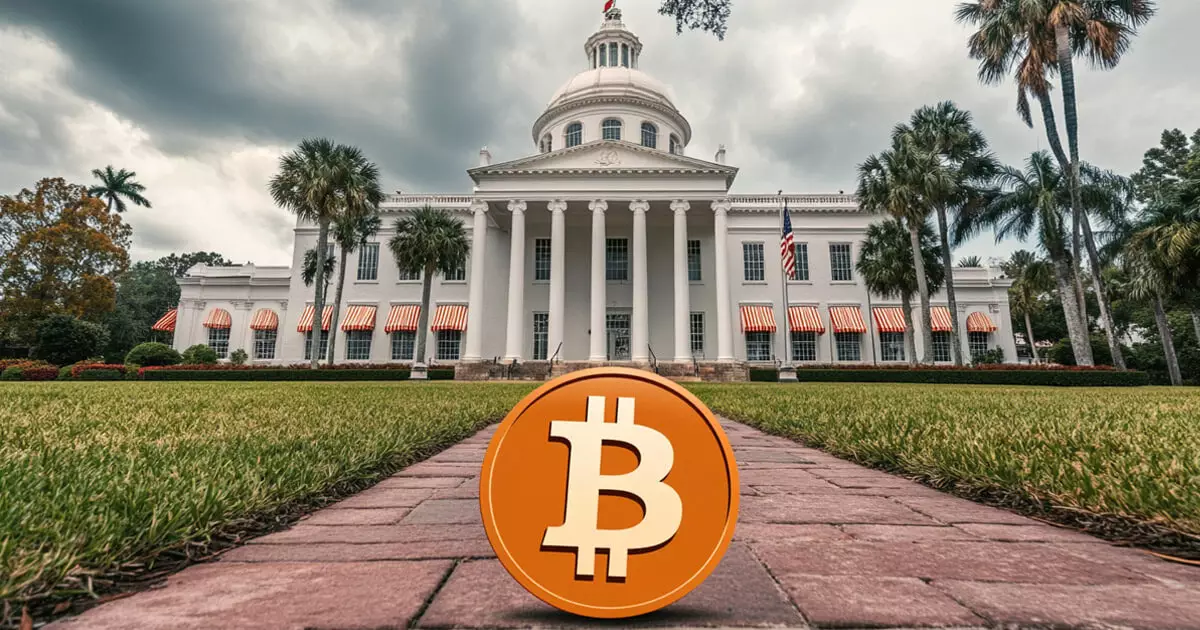The discussion around Bitcoin and digital currencies is no longer confined to the fringes of financial circles; it has entered the political realm, gaining traction among influential lawmakers. This transformation is exemplified by Florida State Senator Joe Gruters, who has articulated a bold vision that integrates Bitcoin into the fabric of state financial governance. In a landscape where currency stability and fiscal autonomy are paramount, Gruters’ legislative efforts, particularly Bill S0550, showcase the urgency of adapting to digital currency’s rise while protecting citizens from looming inflation threats.
Gruters’ ambitions highlight more than just a desire to attract technological innovation; they underscore a growing sentiment that aligning state finances with decentralized digital assets could serve as a hedge against economic instability. With this bill allowing the state to allocate up to 10% of certain funds into Bitcoin, Gruters is not merely taking a gamble; he is advocating for a strategic pivot that could base Florida’s financial foundation on assets increasingly viewed as the future of commerce.
Florida’s Aspiration for Economic Sovereignty
Gruters’ vision extends beyond financial returns; it’s about asserting Florida’s identity as a haven for freedom and financial autonomy. By embracing Bitcoin, the state aims to attract what Gruters terms “economic refugees”—individuals and businesses fleeing regions with heavier regulatory burdens and seeking an environment that champions economic liberty. The ongoing pandemic catalyzed a migration trend toward Florida that has initiated discussions around economic resilience and independence.
This pivot toward Bitcoin could carve out a space for Florida among leading states in embracing cryptocurrencies, echoing Gruters’ assertion that his state is “the place to be.” Such declarations may resonate with constituents who feel disenfranchised by traditional financial systems—those who are increasingly looking for ways to claim control over their financial futures amidst fluctuating economies and unending inflation.
Freedom and Responsibility in Financial Governance
Central to Gruters’ rhetoric is the marriage of freedom and responsibility. By adopting Bitcoin into state financial strategies, Florida is presented as a “pro-freedom state,” aiming to liberate its residents from the traditional confines of state-managed financial systems. The Senator’s alignment with former President Trump’s enthusiastic endorsement of Bitcoin reflects this broader ideological shift within certain political factions. In Gruters’ view, embracing cryptocurrencies contributes to a narrative of individual empowerment—a message that speaks to a significant portion of the Republican base that inherently values fiscal conservatism while simultaneously cherishing personal freedom.
However, the challenge lies in ensuring that the adoption of Bitcoin fosters real financial stability rather than exacerbating volatility. Gruters has indicated that his plans include measures that do not just invite cryptocurrency but address potential pitfalls through transparency and responsible fiscal management. This dual focus is vital; it recognizes the volatile nature of cryptocurrencies while asserting their potential benefit when handled with the decorum expected of public funds.
Potential Risks and Economic Horizons
While the enthusiasm for Bitcoin is palpable, it is critical to consider the underlying risks associated with integrating such a volatile asset into state reserves. The speculative nature of cryptocurrencies makes them inherently risky, and encouraging states to leverage these assets could invite instability rather than promote fiscal growth. Critics may voice concerns that this strategy could result in substantial financial losses at the expense of taxpayer revenues or pension stability.
Nonetheless, the debate ignites an essential dialogue on the future of money and the role of state governance in adapting to evolving monetary landscapes. The dichotomy between traditional fiat and emerging digital currencies is indicative of a broader cultural shift toward decentralization and autonomy—a sentiment that could redefine how state finances are managed in the coming decades.
A Crossroads for Financial Innovation
As Florida endeavors to position itself at the cutting edge of digital finance, it could inspire similar movements across the nation. Gruters’ emphasis on Florida as a national hub is rooted in an understanding that policy decisions made today will ripple through to shape the future economic landscape. As states explore the dual benefits of independence from traditional banking institutions and innovative investment strategies, Florida stands at a fascinating crossroads between risk, opportunity, and, most critically, identity.
In the arena of digital currencies, where the stakes are high, Florida’s lawmakers, guided by figures like Gruters, are poised to challenge not only existing economic paradigms but also the very notion of what constitutes financial governance in the 21st century. This movement champions a future where autonomy and innovation drive economic strategies, reflecting a determination to lead rather than follow—an ethos that may indeed be described as trailblazing in today’s complex fiscal dynamics.



















Leave a Reply